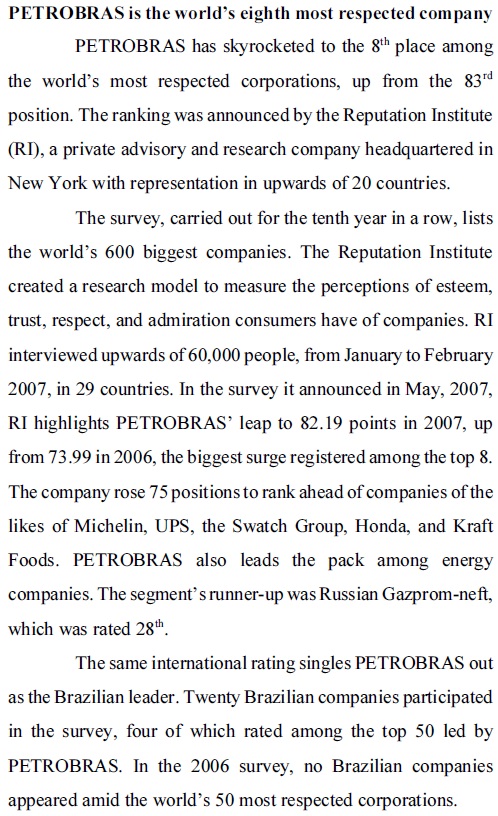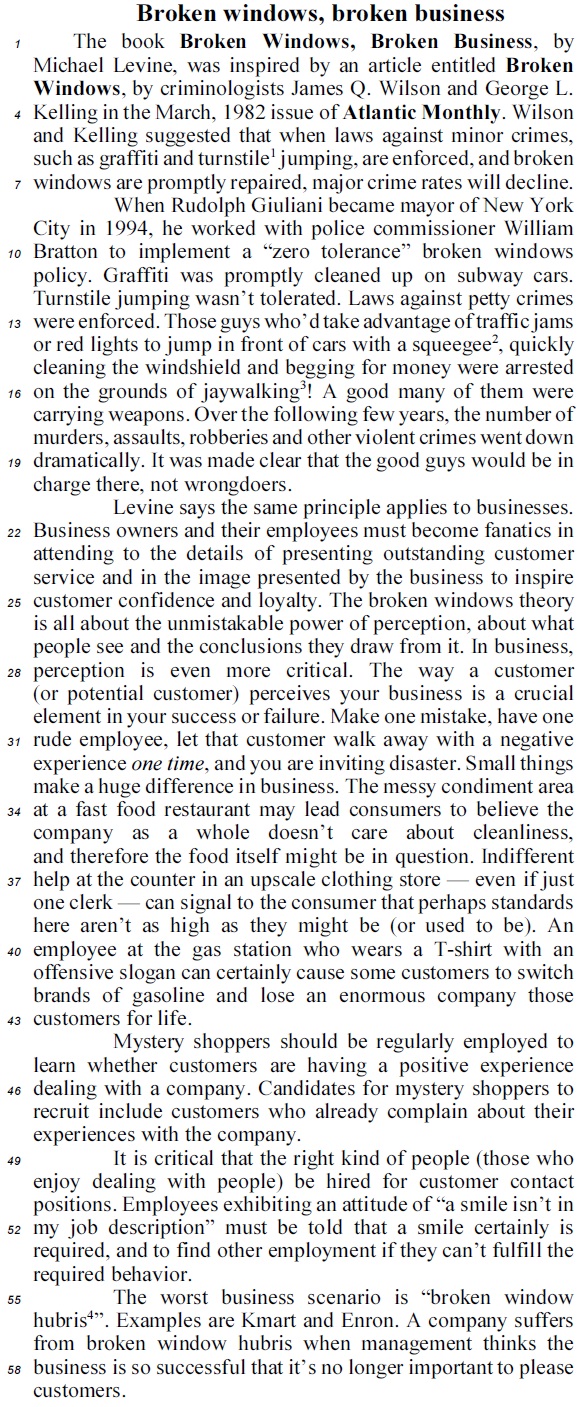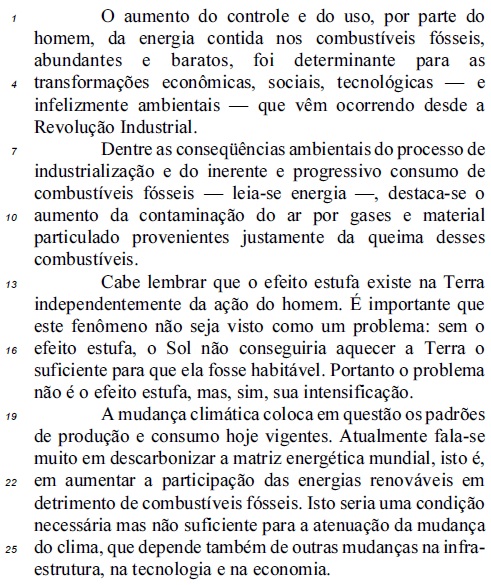Questões de Concurso
Comentadas para analista de sistemas júnior - processos de negócios
Foram encontradas 363 questões
Resolva questões gratuitamente!
Junte-se a mais de 4 milhões de concurseiros!
Gerald Herbert
With crude still hemorrhaging into the Gulf of Mexico, deep-water drilling might seem taboo just now. In fact, extreme oil will likely be the new normal. Despite the gulf tragedy, the quest for oil and gas in the most difficult places on the planet is just getting underway. Prospecting proceeds apace in the ultradeepwater reserves off the coasts of Ghana and Nigeria, the sulfur-laden depths of the Black Sea, and the tar sands of Venezuela’s Orinoco Basin. Brazil’s Petrobras, which already controls a quarter of global deepwater operations, is just starting to plumb its 9 to 15 billion barrels of proven reserves buried some four miles below the Atlantic. The reason is simple: after a century and a half of breakneck oil prospecting, the easy stuff is history. Blistering growth in emerging nations has turned the power grid upside down. India and China will consume 28 percent of global energy by 2030, triple the juice they required in 1990. China is set to overtake the U.S. in energy consumption by 2014. And now that the Great Recession is easing, the earth’s hoard of conventional oil is waning even faster. The International Energy Agency reckons the world will need to find 65 million additional barrels a day by 2030. If the U.S. offshore-drilling moratorium drags on, look for idled rigs heading to other shores. Available in: Retrieved on: June 19, 2011.
Gerald Herbert
With crude still hemorrhaging into the Gulf of Mexico, deep-water drilling might seem taboo just now. In fact, extreme oil will likely be the new normal. Despite the gulf tragedy, the quest for oil and gas in the most difficult places on the planet is just getting underway. Prospecting proceeds apace in the ultradeepwater reserves off the coasts of Ghana and Nigeria, the sulfur-laden depths of the Black Sea, and the tar sands of Venezuela’s Orinoco Basin. Brazil’s Petrobras, which already controls a quarter of global deepwater operations, is just starting to plumb its 9 to 15 billion barrels of proven reserves buried some four miles below the Atlantic. The reason is simple: after a century and a half of breakneck oil prospecting, the easy stuff is history. Blistering growth in emerging nations has turned the power grid upside down. India and China will consume 28 percent of global energy by 2030, triple the juice they required in 1990. China is set to overtake the U.S. in energy consumption by 2014. And now that the Great Recession is easing, the earth’s hoard of conventional oil is waning even faster. The International Energy Agency reckons the world will need to find 65 million additional barrels a day by 2030. If the U.S. offshore-drilling moratorium drags on, look for idled rigs heading to other shores. Available in: Retrieved on: June 19, 2011.
Gerald Herbert
With crude still hemorrhaging into the Gulf of Mexico, deep-water drilling might seem taboo just now. In fact, extreme oil will likely be the new normal. Despite the gulf tragedy, the quest for oil and gas in the most difficult places on the planet is just getting underway. Prospecting proceeds apace in the ultradeepwater reserves off the coasts of Ghana and Nigeria, the sulfur-laden depths of the Black Sea, and the tar sands of Venezuela’s Orinoco Basin. Brazil’s Petrobras, which already controls a quarter of global deepwater operations, is just starting to plumb its 9 to 15 billion barrels of proven reserves buried some four miles below the Atlantic. The reason is simple: after a century and a half of breakneck oil prospecting, the easy stuff is history. Blistering growth in emerging nations has turned the power grid upside down. India and China will consume 28 percent of global energy by 2030, triple the juice they required in 1990. China is set to overtake the U.S. in energy consumption by 2014. And now that the Great Recession is easing, the earth’s hoard of conventional oil is waning even faster. The International Energy Agency reckons the world will need to find 65 million additional barrels a day by 2030. If the U.S. offshore-drilling moratorium drags on, look for idled rigs heading to other shores. Available in: Retrieved on: June 19, 2011.
O uso do termo “diferenciada” com sentido negativo ressuscita o preconceito de classe
“Você já viu o tipo de gente que fica ao redor das estações do metrô? Drogados, mendigos, uma gente diferenciada.” As palavras atribuídas à psicóloga Guiomar Ferreira, moradora há 26 anos do bairro Higienópolis, em São Paulo, colocaram lenha na polê- mica sobre a construção de uma estação de metrô na região, onde se concentra parte da elite paulistana. Guiomar nega ser a autora da frase. Mas a autoria, convenhamos, é o de menos. A menção a camelôs e usuários do transporte público ressuscitou velhos preconceitos de classe, e pode deixar como lembran- ça a volta de um clichê: o termo “diferenciada”. A palavra nunca fora usada até então com viés pejorativo no Brasil. Habitava o jargão corporativo e publicitário, sendo usada como sinônimo vago de algo “especial”, “destacado” ou “diferente” (sempre para melhor). – Não me consta que já houvesse um “diferenciado” negativamente marcado. Não tenho nenhum conhecimento de existência desse “clichê”. Parece-me que a origem, aí, foi absolutamente episódica, nascida da infeliz declaração – explica Maria Helena Moura Neves, professora da Unesp de Araraquara (SP) e do Mackenzie. Para a professora, o termo pode até ganhar as ruas com o sentido negativo, mas não devido a um deslizamento semântico natural. Por natural, entenda-se uma direção semântica provocada pela configuração de sentido do termo originário. No verbo “diferenciar”, algo que “se diferencia” será bom, ao contrário do que ocorreu com o verbo “discriminar”, por exemplo. Ao virar “discriminado”, implicou algo negativo. Maria Helena, porém, não crê que a nova acepção de “diferenciado” tenha vida longa. – Não deve vingar, a não ser como chiste, aquelas coisas que vêm entre aspas, de brincadeira – emenda ela. [...] MURANO, Edgard. Disponível em: . Acesso em: 05 jul. 2011. Adaptado
“A palavra nunca fora usada até então com viés pejorativo no Brasil." (L. 13-14)
A outra possibilidade de escritura, na forma passiva, na qual o sentido NÃO se altera é:

Internet: www.petrobras.com.br (adapted).
Based on the text above, judge the following items.

Internet: www.petrobras.com.br (adapted).
Based on the text above, judge the following items.

Internet: www.profitadvisors.com (adapted).
1turnstile – a narrow gate at the entrance of something, with metal bars that move in a circle so that only one person at a time can go through.
2squeegee – an object used for cleaning windows, consisting of a short handle with a rubber blade.
3jaywalking – a dangerous or illegal way of crossing a street at a place where cars do not usually stop.
4hubris – a very proud way of talking or behaving that offends people.
In the text,

Internet: www.profitadvisors.com (adapted).
1turnstile – a narrow gate at the entrance of something, with metal bars that move in a circle so that only one person at a time can go through.
2squeegee – an object used for cleaning windows, consisting of a short handle with a rubber blade.
3jaywalking – a dangerous or illegal way of crossing a street at a place where cars do not usually stop.
4hubris – a very proud way of talking or behaving that offends people.
According to the text,

A partir do texto acima, julgue os itens subseqüentes.

Tomando por base a organização do texto acima, julgue os itens subseqüentes.

Tomando por base a organização do texto acima, julgue os itens subseqüentes.

André Santos Pereira. Mudança climática e energias renováveis.
Julgue os seguintes itens, a respeito do texto acima.

André Santos Pereira. Mudança climática e energias renováveis.
Julgue os seguintes itens, a respeito do texto acima.

André Santos Pereira. Mudança climática e energias renováveis.
Julgue os seguintes itens, a respeito do texto acima.
I - Mudanças ou erros conhecidos.
II - Fornecedores envolvidos com a entrega de serviços.
III - Novos clientes ou serviços a serem suportados.
É(São) fonte(s) de risco para a operação de serviços de uma organização
